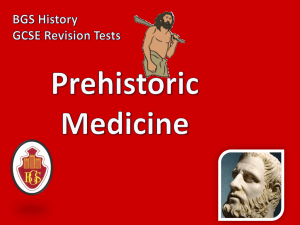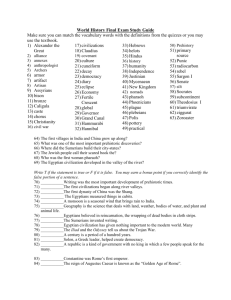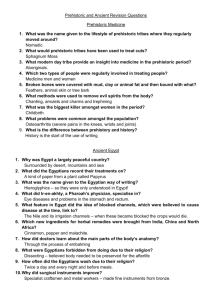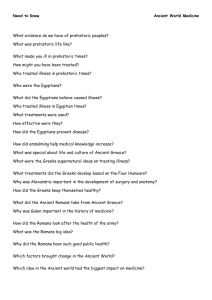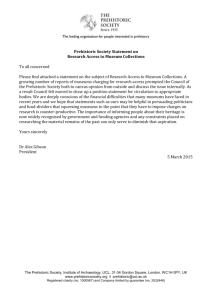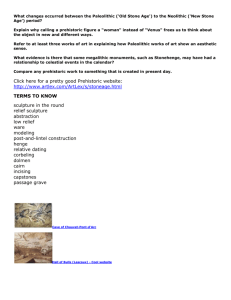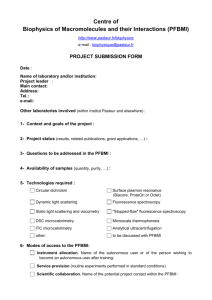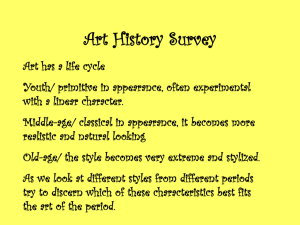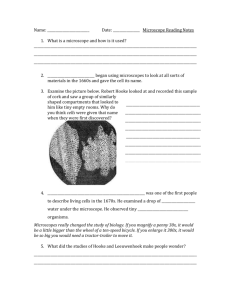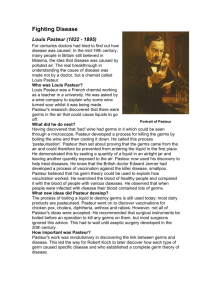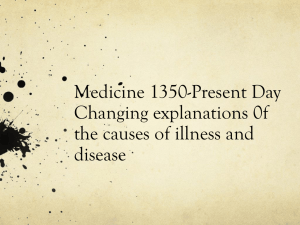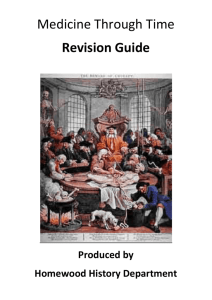Year 10 revision SHP C-D
advertisement
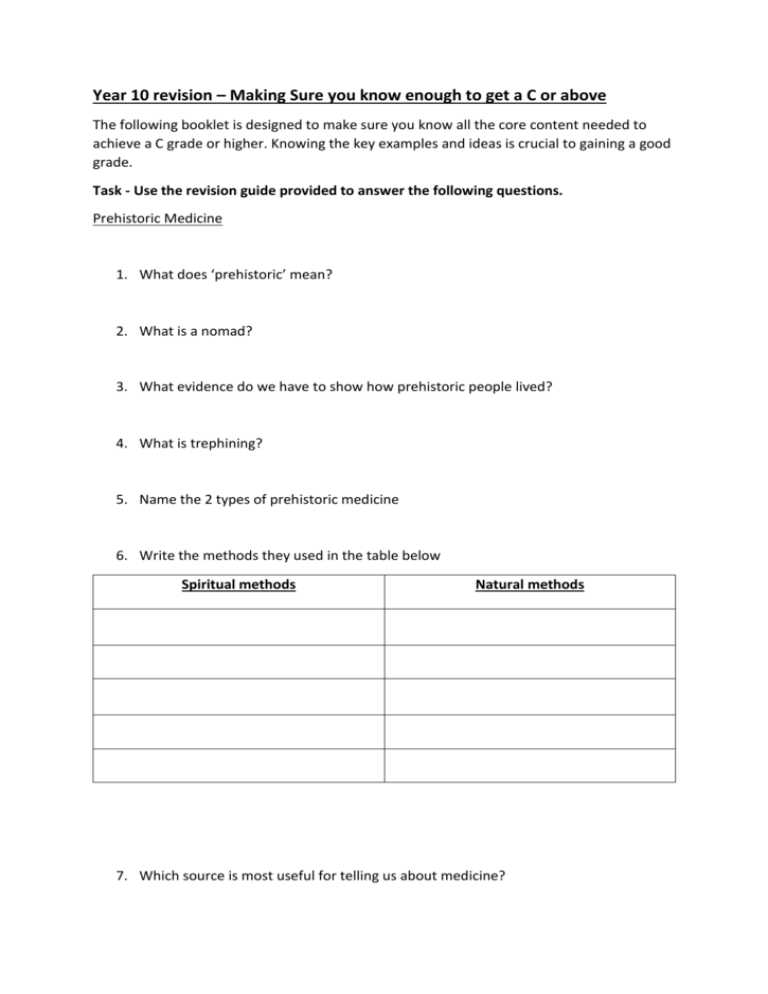
Year 10 revision – Making Sure you know enough to get a C or above The following booklet is designed to make sure you know all the core content needed to achieve a C grade or higher. Knowing the key examples and ideas is crucial to gaining a good grade. Task - Use the revision guide provided to answer the following questions. Prehistoric Medicine 1. What does ‘prehistoric’ mean? 2. What is a nomad? 3. What evidence do we have to show how prehistoric people lived? 4. What is trephining? 5. Name the 2 types of prehistoric medicine 6. Write the methods they used in the table below Spiritual methods Natural methods 7. Which source is most useful for telling us about medicine? 1. 2. 3. ___________________________________________________________________________ ___________________________________________________________________________ ___________________________________________________________________________ ___________________________________________________________________________ ___________________________________________________________________________ ___________________________________________________________________________ ___________________________________________________________________________ ___________________________________________________________________________ ___________________________________________________________________________ ___________________________________________________________________________ ___________________________________________________________________________ ___________________________________________________________________________ ___________________________________________________________________________ ___________________________________________________________________________ 8. Briefly describe ways in which prehistoric people treated illness. Prehistoric treatment can be divided into _________ methods. ________________ and ___________________ . When the people couldn’t explain an illness they thought it was spiritual. They used treatments such as ________________________________ _______________________________________________. They used this method to ________ __________________________________________________. The other treatment was natural. This was when they could see and explain an illness. Treatments they used were _______________________________________. This was used to ____________________________ _________________________________________ 9. Which group of people can we study to compare prehistoric medicine? 10. What is this and what do they do? Medicine man – Pointing stick – Animal fat – Egyptian 1. What did Egyptians think caused disease? 2. What did Egyptians wear to ward off evil spirits? 3. Name a God or Goddess 4. What were they the God or Goddess of and what did they do? 5. What river was important to the Egyptians for every day use? 6. Because of this river the Egyptians came to the conclusion that you became ill when what happened in your body? 7. Name the treatments they used to unblock the channels in your body? 8. What is purging? 9. How did mummification help Egyptians learn about anatomy? 10.Egyptians were not allowed to dissect bodies. Why? Ancient Greece 1. What are the four humours? Complete the boxes. These had to be in balance for a person to be well. Blood air fire Black bile phlegm 2. Who developed the theory of clinical observation? summer winter 3. What was clinical observation? 4. Complete the words that associate with clinical observation Clue D P O T 5. Complete the steps of clinical observation 6. Explain why Hippocrates was an important person in Greek medicine. 7. Who was the Greek God of Medicine? 8. Why did people visit an Asclepion? 9. What happened at an Asclepion? 10. What animal did the Greeks think was a magical healer? Alexandria 1. What type of building was Alexandria? 2. What was allowed to happen in Alexandria that wasn’t allowed to happen in the rest of Greece? 3. What did Alexandria become famous for? Ancient Rome 1. Who wrote the main medical books in Rome? 2. Romans noticed that bad smells, unclean water, sewage, swamps and dirt made people ill. How did they make their public health better, what did they build? 3. Claudius Galen was a Greek physician. He believed a lot of Hippocrates theories, for example, illness was caused by imbalances of the four humours. He also told doctors to observe patients and record the symptoms. What idea did he develop from this? 4. Explain what ‘The Theory of opposites’ means 5. Galen wasn’t allowed to use humans to dissect and study. What did he use? 6. Why did this cause mistakes to happen? 7. Who was more important in the development of medicine, Galen or Hippocrates? On the one hand Hippocrates was important because __________________________________________________________________________________ __________________________________________________________________________________ __________________________________________________________________________________ __________________________________________________________________________________ __________________________________________________________________________________ __________________________________________________________________________________ __________________________________________________________________________________ __________________________________________________________________________________ On the other hand Galen was important because __________________________________________________________________________________ __________________________________________________________________________________ __________________________________________________________________________________ __________________________________________________________________________________ __________________________________________________________________________________ __________________________________________________________________________________ __________________________________________________________________________________ __________________________________________________________________________________ __________________________________________________________________________________ Overall Medieval 1. What destroyed the Roman public health and medical libraries? 2. Who set up Universities where doctors could be trained ? 3. How did war help train doctors? 4. Who had a lot of influence over people in the middle ages? 5. Priests and Monks were the only people able to read in the Middle ages. They controlled education and banned books they did not want people to read. What effect did this have on medicine. Did it progress or hinder it? Explain your answer. __________________________________________________________________________________ __________________________________________________________________________________ __________________________________________________________________________________ __________________________________________________________________________________ __________________________________________________________________________________ __________________________________________________________________________________ __________________________________________________________________________________ __________________________________________________________________________________ __________________________________________________________________________________ __________________________________________________________________________________ __________________________________________________________________________________ __________________________________________________________________________________ 6. What important person does Galen refer to in his work that fitted in with the ideas of the Christian beliefs? 7. What is in the picture below and what was it used for? 8. How are stars linked to medieval medicine? 9. Who was usually left to treat war wounds and why was it risky? 10. Why was the public health so bad at this time and why did people think it was safer to drink beer rather than water? 11. What disease arrived in Britain in 1348 on rats? 12. What were the symptoms? 13. Below is a list of what people thought caused the plague. Next to it write how they treated it Miasma: God: Humours out of balance: Poisoned water: 14. Complete the quick summary of medieval medicine Doctors followed the ideas of __________________. They believed illness was caused by an imbalance in _______________________. Believed that _________ and the Devil influenced health. Disease was seen as God’s _________________ for your sins. Astrology became important. Doctors studied ____________ because they believed the movement of planets affected people’s health. Renaissance 1. Renaissance means rebirth. There was greater interest in how the human body worked based on observation and dissection. Artists went to dissections of human corpses and drew accurate illustrations for medical books. Why did this have a positive impact on medicine progressing? 2. Name 2 of the famous books written by Andreas Vesalius? 3. Why were these books so important? What was in them? 4. What was invented at this time that made it more possible to spread the word in these books? 5. Vesalius made dissections on dead bodies himself. Why was this a better way to understand anatomy? (Think of what they based anatomy on and who usually carried out the dissections in the past) 6. Ambroise Pare was a battlefield surgeon. Oh No! He’s run out of boiling oil. What was boiling oil used for? 7. What did he use instead? 8. What was another factor in the discovery of this new treatment on gunshot wounds? 9. Why is a bezoar stone important when we tell the story of Pare? Think about what it was and what it was used for etc. 10. One of the main treatments was bleeding. Why was William Harvey so important in proving this was wrong? 11. What plague hit in 1665 and what happened? 12. What historical event happened in 1666 that helped control this plague? 13. Complete the table below. How did these factors affect medicine during the renaissance? Were they a positive or negative factor? Factor Effect Printing press Weakening power of the Church More accurate artists drawings from real life Renewed interest in Ancient learning 14. What was the Royal Society? 1750-1900 Smallpox and Edward Jenner 1. Who brought the idea of incoculation to Britain? 2. What had she discovered about smallpox 3. However what was a negative sideeffect to inoculations? Positive or negative 4. What was Edward Jenners occupation and how did this help him with the fight against smallpox? 5. What did he do to prove his theory? 6. Some people were against the smallpox vaccination, why? Look at the picture below to give you a clue! 7. One positive reaction to Jenner’s vaccination was that Parliament gave him money so that he was able to progress. State 2 more positive reactions. 8. Complete the sentences Inoculation – Infecting someone with a ______________ version of a disease so that they become _______________ Vaccination – Infecting someone with a ________________ disease so that they become __________________ to other diseases as well. Nursing 1. Florence Nightingale and Mary Seacole made a positive impact in the development of nursing. Using 2 colours sort which statement belongs to which Nurse 1805-1881 ; born in Jamaica Born in Florence, Italy Worked on the battlefield Set up medical stores in Crimea Work experience in hospitals Treated on wards in Crimea Worked with Invalid soldiers in Jamaica She was rejected permission to go to Crimea, so made her own way there Set new standards for the treatment wards in Crimea Invited with 38 other Nurses to Crimea Wrote an autobiography to tell her story Florence Nightingale Mary Seacole Presented the Queen with a list of improvements needed for nursing Louis Pasteur’s Germ Theory 1. “Germs are the result of disease not the cause”; what is this called? 2. How did Pasteur develop Germ Theory? 3. Pasteur – Germ theory (Germs are the cause of disease) Replaces spontaneous generation Robert Koch – Identifying germs for specific diseases. Medical background and has microscopes to help, has industrial dyes to see germs Pasteur – Chicken cholera. Chance plays a role. Charles Chamberland (part of Pasteurs team) goes on holiday and leaves out the chicken cholera germs on his desk. This weakens the disease. Injects chickens when he returns from holiday. This leads to ATTENUATION – weaker form of disease Pasteur – produces Anthrax vaccination Pasteur – develops rabies vaccination Koch – Produces diphtheria vaccination Koch – produces TB vaccine, however it works on animals, but doesn’t work on humans. He’s humiliated and ends his career Who was more important for medical developments – Pasteur or Koch? ___________________________________________________________________________ ___________________________________________________________________________ ___________________________________________________________________________ ___________________________________________________________________________ ___________________________________________________________________________ ___________________________________________________________________________ ___________________________________________________________________________ ___________________________________________________________________________ ___________________________________________________________________________ Overcoming problems of surgery 1. Surgery in early 1800s was dangerous and painful. What was the greatest danger to patients? 2. Why were some people against anaesthetics? State 3 reasons. 3. Which important lady accepted the use of chloroform as an anaesthetic during childbirth? This led to the acceptance of anaesthetics How was the problem of infection overcome 1. Joseph Lister heard that carbolic spray was used on sewage. He knew sewage had a similar smell to gangrene. He knew of Pasteurs germ theory. So carbolic spray was used in surgery. However what were the reasons for oppostition to Lister? 2. What does aseptic mean? 3. What methods were introduced that had to be carried out before a surgery? Public health in 1800s 1. What attitude did the government have toward the public health in British Towns? 2. What does laissez-faire mean? 3. Thanks to the report “Report on the Sanitary Conditions of the Labouring Population” written by Edwin Chadwick in 1842, what action did industrial towns have to take? An example is given below, there are 2 more *organise drainage and refuse collection * * 4. What year was the first Public Health Act passed? 5. A Board of Health Act was set up to encourage local authorities to improve conditions. However what reason was it abandoned in 1854? 6. John Snow proved that there was a link between cholera and water supply in 1854. How did he do this? 7. What was the ‘Great stink’ of 1858? How did this lead to a better drainage and sewage system? 8. What happened in the Second Reform act in 1867? 9. In 1875 the Second Public Act was reinforced. The following measures were brought in; 1) provision of clean water 2) proper drainage and sewage 3) the appointment of a Medical Officer of Health. What was different about this act to the first Health Act of 1848? 10. Write 3 results of the Public Health Act of 1875. An example is given to you. *Stopped the pollution of rivers which people got water * * * 20th Century 1. What medical progress did the First World War bring about? 2. Why was it important x-rays were developed and installed in hospitals along the Western Front in WW1? 3. Blood transfusions sometimes worked and sometimes failed. This was due to doctors not understanding blood groups. However they were discovered in 1901, by who? 4. Why was it important that different blood groups were discovered? 5. How was blood stored, and why was it so important to discover this? 6. What important drug, which was discovered by Fleming in 1928, was produced to treat all allied forces wounded in the D-Day invasion of Europe? 7. How was penicillin discovered? Think about who discovered it and what did he do that led to the discovery. 8. Name the 2 Oxford scientists that helped develop penicillin. 9. Which country helped mass produce penicillin? 10. Complete the table below. Factors leading to the development of penicillin Factor Government Technology Scientific experiment Individuals/people War chance How did it lead to the development of penicillin 11. What impacts did the Second World War have on medicine? Complete the table Blood transfusion Diet Drugs Poverty Surgery Hygiene The National Health Service (NHS) 1. How did WW2 lead to the NHS? 2. Who introduced the NHS and what was his occupation? 3. What is National Insurance? 4. What problems does the NHS still have?
